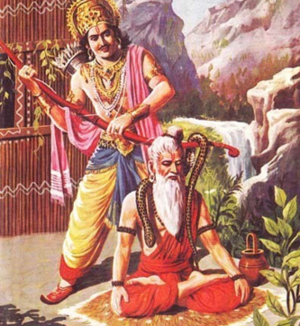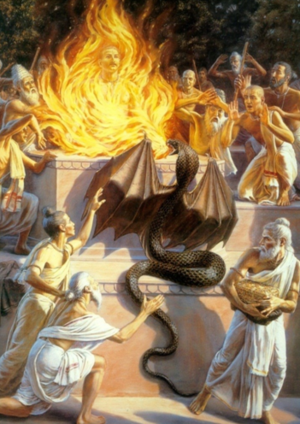Talk:Lunar Dynasty:Parīkṣit
By Vishal Agarwal
About 3500 years ago in India, a great war was fought between two groups of cousins – the five Pāṇḍava brothers, and 100 Kaurava brothers. The war was fought with 4 million soldiers in a place called Kurukṣetra, about 100 miles north of New Delhi, the capital of India. The Pāṇḍavas won the war, but all their children were killed. Only their grandson Pareekshit, who was born right after the war, survived. The Pāṇḍava brothers took great care that Pareekshit grew up to be a wise, educated and a virtuous Prince.
Yudhiṣṭhira, who was the eldest Pāṇḍava brother, ruled for more than 30 years. Then, all the five brothers decided to hand over their kingdom to Pareekshit, and they went to heaven.
Pareekshit became the Emperor of India after the Pāṇḍava princes retired. He was a very fair and just ruler. He made sure that there were no thieves and murderers in his kingdom. No one in his country went hungry. The rains came on time. He gave lots of donations to learned men and fed the poor. Everyone was happy in his kingdom and they thanked Bhagavān for making Pareekshit their king.
One day, on a hot summer day, Pareekshit went for hunting. After pursuing wild deer for several hours, he became very tired and searched for some water. Suddenly, he saw a small hut. He thought that the owner of the hut might have some water. When he entered the hut, he saw Ṛṣi Śamika inside. The Ṛṣi was meditating, with his eyes shut and his mind thinking of Bhagavān. Obviously, Śamika did not notice the king arrive.
Pareekshit asked Ṛṣi Śamika for some water. But the Ṛṣi was lost deep in meditation and did not hear him. Pareekshit felt insulted and he became very angry. He said, “How dare you ignore your own King? I will teach you a lesson!” Pareekshit looked around and found a dead snake in the grass. He picked the snake with his bow, and put it around the neck of Śamika, who was still meditating.
Some students of the Ṛṣi who were playing outside the hut saw this. They were shocked. They rushed to Śṛṅgi, the son of Śamika, and told him everything. Meanwhile, Pareekshit left for his palace.
When Śṛṅgi arrived and saw the dead snake around his father’s neck, he too became very angry. Now, Śṛṅgi was also a great Ṛṣi. The words of a Ṛṣi always come true. Therefore, he now cursed Pareekshit, “Seven days from now, a flying snake will bite you to death.”
After a few moments, Ṛṣi Śamika came out of his meditation. When he heard what his son had done, he scolded him, “Śṛṅgi, what was the need to curse a great king like Pareekshit? He did not do anything that hurt me or harmed me. Ṛṣis should learn to control their anger. What you did was very wrong.” Ṛṣi Śṛṅgi now felt very guilty, but he could not take back the curse.
Emperor Pareekshit and the Power of Repentance
Meanwhile, Pareekshit felt very sorry about what he had done to Ṛṣi Śamika. He thought, “I have always loved everyone. I have always respected Ṛṣis and Paṇḍits. Why did I do such a wicked deed today? Maybe I was irritated because I was thirsty. But even then, I should not have gotten angry at Ṛṣi Śamika. I am sure he did not hear me because he [was] in deep meditation. Now, what can I do to get punishment for my evil deed, which I did because I did not control my anger?”
Śamika sent a messenger to Pareekshit to inform him that his son had cursed the king to die after seven days of a snake-bite. When Pareekshit heard of this, he sent his apologies to Ṛṣi Śamika. Then he thought, “I do deserve this punishment. It serves me right. I will now leave my palace and go to the banks of river Gaṅgā. There, I will spend the remaining seven days of my life in worshipping Bhagavān Viṣṇu and will wait for my death.”
Pareekshit listened to stories of Viṣṇu for seven days. Then, a snake came and bit him, and he died. But having listened to the inspiring story of Viṣṇu, he embraced death with a smile. Because, he knew that his death would lead him to immortality. The story of Pareekshit shows how even good people can behave very badly when they get angry. Therefore, we should try to control our anger at every time.
Practical Methods of Overcoming Anger
- Take deep breaths. Sometimes, we get angry in a hurry because we have not studied the situation carefully before blaming someone else quickly. Therefore, taking deep breaths gives us some extra time to think it over, and also relaxes our agitated mind and heart.
2. Think over the issue again to determine if you have become angry in haste. Try to study yourself and see if you are angry because you are tired or hungry, and not because the other person is at fault.
3. Start doing something different, or think something else. This will divert your mind and your anger will wear off after some time.
4. Drink a glass of cold water, or take a cold shower. Sometimes, we get angry because of the uncomfortable environment around us – too high humidity or temperature, thirst or hunger. These factors make us irritable. Therefore, try to make yourself more comfortable by quenching your thirst etc., and you will feel better.
5. Go to an empty room and sit alone for some time. Getting away from the scene that caused you anger can be beneficial. In solitude, you can just vent your anger at yourself, instead of directing it towards others.
6. Take some rest. Eat something.
7. If the anger is towards a person, then think of the times when he/she has done good things to you. Use these more pleasant memories to forgive that person.
8. When vicious and evil people make us angry, practice indifference (upekṣā) towards them. Just ignore them.
Abraham Lincoln suggested a very practical way of controlling one’s anger. He said that whenever we get angry, we should write down in a letter why and on whom we got angry. But we should not mail that letter. Instead, when the mind gets calm, read that letter and reflect whether it was OK to have got angry, and whether the person to whom the anger was directed has any positive qualities. Reflect whether that person committed the mistake that made you angry out of any genuine reason. You will realize that in most cases, your anger was not justified, and would have been an impulsive act that you could have taken without looking at the situation from all angles.


